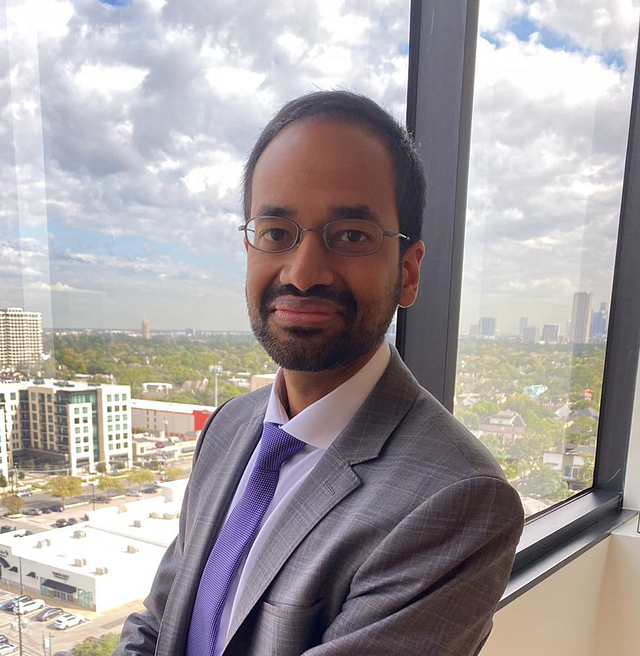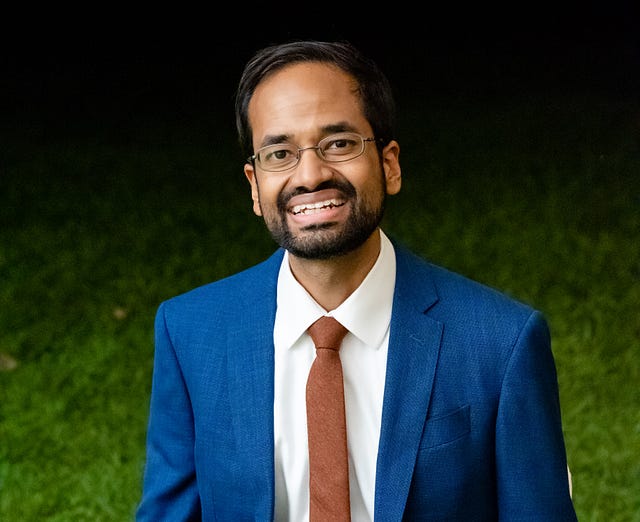Have a stop time for your workday! If we don’t enforce a stop time, we can easily trick ourselves into thinking we have to always be on. There will always be more than enough work. Pick a time to stop working and enjoy life. Let’s enjoy the things we’re working for, like our family, friends, and hobbies.
With all that’s going on in our country, in our economy, in the world, and on social media, it feels like so many of us are under a great deal of stress. We know that chronic stress can be as unhealthy as smoking a quarter of a pack a day. For many of us, our work, our livelihood, is a particular cause of stress. Of course, a bit of stress is just fine, but what are stress management strategies that leaders use to become “Stress-Proof” at work? What are some great tweaks, hacks, and tips that help to reduce or even eliminate stress from work? As a part of this series, I had the distinct pleasure of interviewing Johann D’Souza.
Johann D’Souza, PhD is a practicing clinical psychologist specializing in cognitive behavior therapy for anxiety and obsessive-compulsive disorder. His research publications focus on the psychological benefits of resilience factors such as hope and optimism as protective against anxiety. Johann is a research affiliate at Harvard’s Human Flourishing Program and is the head of coaching at OptimalWork.
Thank you so much for joining us in this interview series! Before we dive in, our readers would love to know how you got from “there to here.” Inspire us with your backstory!
Clinical Psychology is a long path, and I couldn’t have done it without generous, inspiring mentors as well as resources compiled from those who have come before me. This is why I’m grateful for outlets like Authority Magazine, which help people see if a particular path is for them and to learn from the mistakes that others have made on the way. I’ve had a circuitous path with my fair share of mistakes. However, in hindsight the mistakes can look like battle scars on my character that make the adventure worth telling. Just to give a sense of my winding road, I majored in Theology as an undergrad in Dallas, worked in sales and then as a teacher in Houston, moved to New York to work as an SAT tutor, then a paralegal at 2 different firms, then got two Masters degrees before finally earning a PhD in Clinical Psychology.
What lessons would you share with yourself if you had the opportunity to meet your younger self?
So many! Practice mindfulness every day 🙂 Be honest with yourself and honest with others. Swallow the frog! (do the hardest thing first every day). Don’t expect encouragement from other people, but always be encouraging towards them. Take more risks. Consistently invest time in reading. Prioritize friendships. In sum, do what’s important, not just urgent.
None of us are able to experience success without support along the way. Is there a particular person for whom you are grateful because of the support they gave you to grow you from “there to here?” Can you share that story and why you are grateful for them?
I’m grateful to have met remarkable men in my life, people the likes of whom I wouldn’t have known existed had I not met them. They have deeply impacted my life, and I think about them and their lessons regularly. Two that stand out are Kevin Majeres, the founder of OptimalWork, and a man I will refer to as Dave. Kevin is one of those rare individuals who speaks better than most people write. He taught me how to find meaning and fulfillment in work, turning work into an engine of self-growth rather than an object of dread. Dave taught me that cheerfulness, creativity, and persistence can solve many of the problems we face. We are capable of so much more than we think. We are capable of breaking out of the limitations which we set for ourselves and of becoming great by drawing others to greatness.
Are you working on any exciting new projects now? How do you think it might help people?
I’m exploring a concept for a private psychology practice called Modern Psychology, Traditional Values to provide an option for patients looking for cutting edge therapy aligned with traditional values. I’m also excited to take the OptimalWork coaching program to the next level with coaching arrangements for high profile business.
Ok, thank you for sharing your inspired life. Let’s now talk about stress. How would you define stress?
A syndrome of thoughts and feelings resulting from a negative attitude towards challenges.
In the Western world, humans typically have their shelter, food, and survival needs met. So what has led to this chronic stress? Why are so many of us always stressed out?
Multitasking. How much do you think a 19th century shepherd multitasked? What’s causing us to multitask? Digital technology. Email. Smartphones. “Social” media. The answer is obvious. We all know it. We just need to 1) be honest with ourselves and 2) come up with strategies to reduce bad habits.
What are some of the physical manifestations of being under a lot of stress? How does the human body react to stress?
Studies show that toxic stress is associated with accelerated aging and all-cause mortality. Sounds pretty bad huh? But there’s hope…
Is stress necessarily a bad thing? Can stress ever be good for us?
Amazingly, stress can actually be good for us. Kelly McGonigal from Stanford University has compiled many studies supporting the “upside of stress.” It turns out that our appraisal of (or attitude towards) stress determines whether it is bad for us or good for us. Stress is associated with all-cause mortality, if you believe it is bad for you. But if you believe stress is good, then it becomes the ultimate performance enhancing drug increasing our executive functioning, speaking ability, and test-taking performance among other benefits.
Is there a difference between being in a short term stressful situation versus an ongoing stress? Are there long term ramifications to living in a constant state of stress?
It’s true that our brains and bodies need breaks and rest. However, rather than focusing on short-term versus long-term stress, I’d like to focus on the potential for stress to bring out our best by viewing the situation as an exciting challenge to take on versus a threat to be dreaded and avoided. Challenges bring out the best in us! See the situation as a learning opportunity, a way to practice, and ultimately, an opportunity to grow in your highest ideals and you will experience the upside of stress.
Is it even possible to eliminate stress?
No! And if we tried to, we’d become more stressed than ever. Avoidance of and the desire to control stress is the root of anxiety disorders.
In your opinion, is this something that we should be raising more awareness about, or is it a relatively small issue? Please explain what you mean.
Discovering the upside of stress has personally changed my life and the lives of people I’ve worked with. I think we should help as many people as possible discover this insight so that they can find meaning in their work and relationships.
Let’s talk about stress at work. Numerous studies show that job stress is the major source of stress for American adults and that it has escalated progressively over the past few decades. For you personally, if you are feeling that overall, work is going well, do you feel calm and peaceful, or is there always an underlying feeling of stress? Can you explain what you mean?
Think back to childhood. Do you remember the feeling you got right after school ended and summer vacation began? It felt relieving and euphoric at first…but then if you had long stretches of time without anything to do, you may have felt depressed and aimless.
We need challenges in our life. I have found that fulfillment comes, not from an absence of challenges, but from facing challenges head on and striving to grow in my ideals through the challenges. Facing challenges doesn’t mean feeling stressed, but it does mean exerting effort and deliberately reframing when we feel reluctance building.

Okay, fantastic. Here is the main question of our interview: Can you share with our readers your “5 stress management strategies that busy leaders can use to become “Stress-Proof” at Work?” Please share a story or example for each.
- Deliberately reframe challenges
What quality do you admire most in others? Then consider how the challenge you’re facing, gives you an opportunity to grow in that quality.
I admire wisdom. A common challenge for me is getting to appointments early, because I really don’t like waiting — it feels like a waste of time! However, wisdom teaches us that doing things well is more important than simply getting things done. Wisdom teaches us to slow down and enjoy life. Wisdom teaches us to enjoy silence and simply being with others. Therefore, arriving a couple minutes early to appointments, calmly, without rushing, is a perfect way for me to grow in wisdom.
2. Give yourself time for mindfulness each day
I started practicing mindfulness in high school, and it had a profound impact on me. I stopped after college because I didn’t know how to fit it into my schedule. Starting a few years ago, OptimalWork taught me a strategy that has brought mindfulness and it’s benefits back into my life. Before starting each hour of work, I simply pause for 30–60 seconds and take 3 slow breaths.
3. Work with a timer
Have you ever experienced the deadline benefit? We perform better when we experience a sense of urgency due to an external demand. We can create this sense of urgency for ourselves by setting a timer before beginning a task. If you practice stopping the task when the timer goes off, then your brain learns to compress the steps of the task into the time it’s given. It’s amazing how this simple practice sharpens our focus.
4. Follow a schedule
Feeling overwhelmed comes from believing we don’t have enough time to finish all our tasks. By having a clear schedule and slotting in our tasks at specific times we realize that there is often more than enough time if we use it wisely.
5. Have a stop time for your workday!
If we don’t enforce a stop time, we can easily trick ourselves into thinking we have to always be on. There will always be more than enough work. Pick a time to stop working and enjoy life. Let’s enjoy the things we’re working for, like our family, friends, and hobbies.
Do you have any favorite books, podcasts, or resources that have inspired you to live with more joy in life?
Yes! The Golden Hour podcast from OptimalWork as well as their online MasterClass. It’s pretty much the only thing I listen to now, and I listen to most episodes twice. Great works of literature like War and Peace and Lord of the Rings (yes, it is a great work of literature) also give me hope in humanity.
You are a person of great influence. If you could start a movement that would bring the most amount of good to the most amount of people, what would that be? You never know what your idea can trigger. 🙂
I would like to foster a network of virtuous leaders for mutual support and encouragement as they pursue their magnanimous dreams.
What is the best way for our readers to continue to follow your work online?
Stay tuned for my podcast, Virtuous Leaders with Dr. Johann D’Souza!
This was very inspiring. Thank you so much for the time you spent on this. We wish you only continued success.
Thank you so much for your kindness and the good you do in the world!


